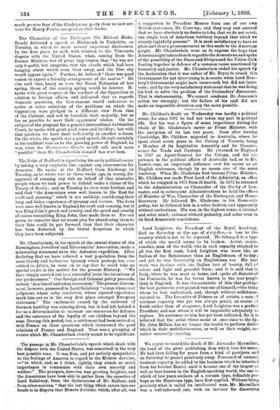The passage in Mr. Chamberlain's speech which dealt with the
dispute with the United States, was conceived in the very best possible tone. It was firm, and yet entirely sympathetic to the feelings of America in regard to the Monroe doctrine, —" to *Ugh, and, as I think, rightly, they attach so much importance in connection with their own security and welfare.", The prospect, however, was growing brighter, and the Americans have been able to gather from the speeches of Lord Salisbury, from the declarations of Mr. Balfour, and , from other sources, "that the last thing which enters into our heads is to dispute that Monroe doctrine, which, after all, was a suggestion to President Monroe from one of our own British statesmen, Mr. Canning; and they may rest assured that we have absolutely no desire to take, that we do not covet, one single inch of American territory beyond that which we already rightfully possess." It is most satisfactory to have so plain and clear a pronouncement as this made to the American people. Mr. Chamberlain went on to express the hope that America might take action in regard to the Armenians, and spoke of the possibility of the Stars-and-Stripes and the Union-Jack floating together in defence of a common cause sanctioned by humanity and justice. Mr. Chamberlain ended his speech by the declaration that it was unfair of Mr. Bryce to attack this Government for not intervening in Armenia when Lord Rose- bery's Government might have intervened, but did not inter- vene; and by the very satisfactory statement that he was doing his best to solve the problem of the Outlanders' discontent. That is statesmanship. We cannot condemn Dr. Jameson's action too strongly; but the failure of his raid did not make an impossible situation any the more possible.






































 Previous page
Previous page